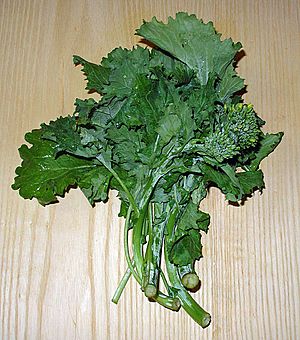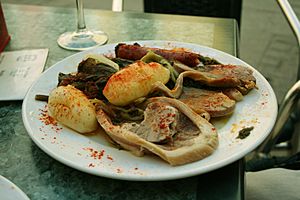Rapini facts for kids
Quick facts for kids Rapini |
|
|---|---|
 |
|
| Species | Brassica rapa |
| Cultivar group | Ruvo group |
| Nutritional value per 100 g (3.5 oz) | |
|---|---|
| Energy | 92 kJ (22 kcal) |
|
2.85 g
|
|
| Sugars | 0.38 g |
| Dietary fiber | 2.7 g |
|
0.49 g
|
|
|
Protein
|
3.17 g
|
| Vitamins | Quantity
%DV†
|
| Vitamin A equiv.
beta-Carotene
lutein zeaxanthin
|
16%
131 μg
15%
1573 μg1121 μg
|
| Thiamine (B1) |
14%
0.162 mg |
| Riboflavin (B2) |
11%
0.129 mg |
| Niacin (B3) |
8%
1.221 mg |
| Pantothenic acid (B5) |
6%
0.322 mg |
| Vitamin B6 |
13%
0.171 mg |
| Folate (B9) |
21%
83 μg |
| Vitamin C |
24%
20.2 mg |
| Vitamin E |
11%
1.62 mg |
| Vitamin K |
213%
224 μg |
| Minerals | Quantity
%DV†
|
| Calcium |
11%
108 mg |
| Iron |
16%
2.14 mg |
| Magnesium |
6%
22 mg |
| Manganese |
19%
0.395 mg |
| Phosphorus |
10%
73 mg |
| Potassium |
7%
196 mg |
| Sodium |
2%
33 mg |
| Zinc |
8%
0.77 mg |
| Other constituents | Quantity |
| Water | 92.55 g |
|
Link to USDA Database entry
|
|
| †Percentages estimated using US recommendations for adults. | |
Rapini or broccoli rabe (pronounced rahb) is a leafy green vegetable. It's part of a group of plants called cruciferous vegetables. You can eat its leaves, buds, and stems. The buds look a bit like tiny broccoli florets, but they don't grow into a big head. Rapini has a slightly bitter taste. It's very popular in foods from the Mediterranean region.
What is Rapini?
Rapini is a plant that first grew in Europe. It belongs to the mustard family of plants. Other plants in this family include turnip and bok choy. Scientifically, rapini is known as Brassica rapa var. ruvo. People also call it broccoletti, broccoli raab, spring raab, or ruvo kale.
Look and Health Benefits
Rapini has many spiky leaves. These leaves surround small clusters of green buds. Sometimes, you might see tiny yellow flowers blooming among the buds.
Rapini is good for you! It's full of important vitamins like Vitamin A, Vitamin C, and Vitamin K. It also has important minerals like potassium, calcium, and iron. These help your body stay healthy and strong.
Cooking with Rapini
Rapini has a unique flavor. Some people describe it as nutty, bitter, or even like almonds. When rapini is young, you can eat the whole stalk. As it gets older, the bottom part of the stalk can become a bit tough. You just need to trim the very bottom before cooking.
Rapini is a common ingredient in Roman and Southern Italian cooking. You'll find it in places like Sicily, Calabria, Campania, and Apulia. In Italy, it's often called cime di rapa or broccoletti di rapa. In Naples, it's known as friarielli.
In Portugal, a similar vegetable called grelos de nabo is used. Rapini is also popular in the Galicia region of Spain. They even have a rapini festival there every February!
You can cook rapini in many ways. It's often sautéed or braised. This means cooking it quickly in a pan with olive oil and garlic. Sometimes, people add chili pepper or anchovy for extra flavor. Rapini can be used in soups, or served with orecchiette (a type of pasta) or pan-fried sausage. Sometimes, rapini is quickly boiled (called blanching) before it's cooked further.
In the United States, rapini is very popular in Italian-American homes. The D'Arrigo Brothers helped make it well-known in the U.S. and gave it the name broccoli rabe. You might find broccoli rabe in some hoagies or submarine sandwiches. For example, in Philadelphia, a popular sandwich has roast pork, sharp provolone cheese, broccoli rabe, and peppers. It's also great in pasta dishes, especially with Italian sausage.
See also
 In Spanish: Grelo para niños
In Spanish: Grelo para niños
 | Emma Amos |
 | Edward Mitchell Bannister |
 | Larry D. Alexander |
 | Ernie Barnes |


